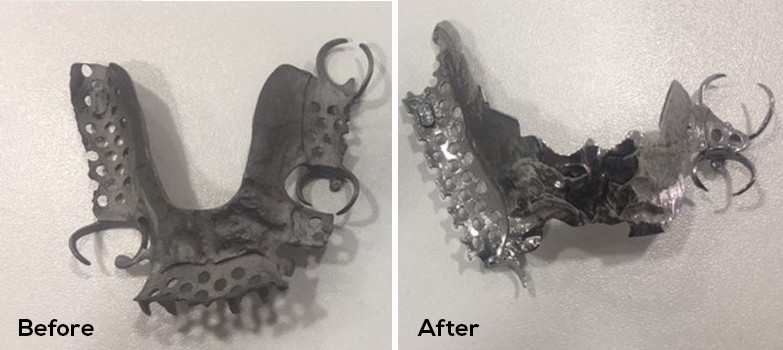One of ActOn’s latest projects included developing a Surface Finishing process for a well known medical implants manufacturer. The requirement was to develop a cost effective solution, to mirror polish and obtain a smooth finish on Dental Partials.
In this case study we will look at how you can mass finish between 20 and 120 dental implants per batch and how to obtain the same results every time.
The aim
The main focus of this project was to obtain a smooth and mirror finishing on the Dental Partials. Also the customer was keen on finding the surface finishing technology that would be affordable and efficient in comparison with manual finishing. Moreover as there is a required throughput of 20 parts/ day, we had to determine the most optimum mass finishing process for the part.
What we did
As we have previously worked on a similar project, we knew that the most efficient technology for surface finishing and polishing the dental prosthesis was the CPM10 Centrifugal High Energy finishing machine. Through testing we also determined that each barrel of the CPM10 could handle between 5 and 6 implants. As this machine has 4 barrels, a total of 20 to 24 parts could be processed simultaneously.
The CPM10 is built with the latest high energy technology and it has a direct drive system with counter rotating turrets and barrels. Typically used for small components, it can be aggressive enough to handle your toughest burr, yet precise enough to process the most delicate piece.
Using the CHE technology we have achieved the mirror finish in a three-stage process, which combines cutting down, brightening and mirror polishing the dental partials. In the first stage we have processed the parts using ActOn abrasive ceramic media and a liquid compound, which is a good cleaner, polisher and corrosion inhibitor. In this stage the scratches made by the stone were removed and the rubber wheels and point were eliminated.
To complete the surface finishing and brightening process, we then mass finished the prosthesis in a low abrasive plastic media and the same polishing compound. This stage also enabled to eliminate the stripping acid solutions.
The final finishing stage was carried out to bring the casting to a mirror finish and to eliminate the compounds as well as the mounted felt wheels. This was easily achieved by processing the dental partials in ActOn’s pretreated walnut shell. The main benefit of using the pretreated walnut shell in a Centrifugal High Energy Machine, is that this imparts high luster on components. It has been proven that on certain materials, pretreated walnut produces a much brighter finish than pretreated Maizorb (Corn Cob).

Benefits of the surface finishing & mirror polishing processes
- We helped our client to move from manual finishing to a more efficient way of finishing the parts
- The client can now achieve the required daily throughput by using the CPM10 finishing machine.
- The average process time of a batch is between 2 to 3 hours, making this an efficient and cost effective process.
- If there is a requirement for processing larger quantities of dental partials, the trial showed that the CHE30 finishing machine can process between 75 and 90 parts / batch, while the CHE40 can accommodate between 100 and 120 parts / batch
To learn more about ActOn’s finishing technology for Medical Implants and Instruments please visit the Industries page. To discuss your mass finishing project contact our technical team at [email protected]

